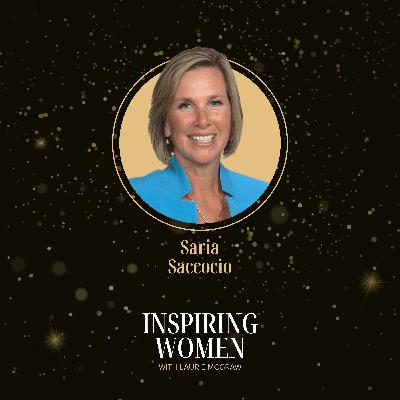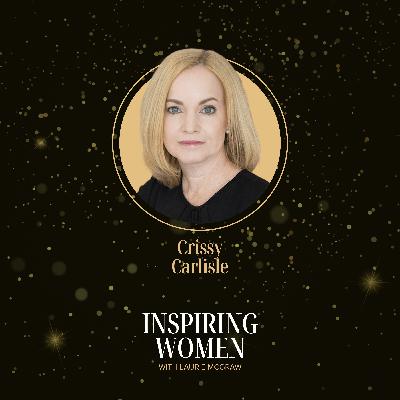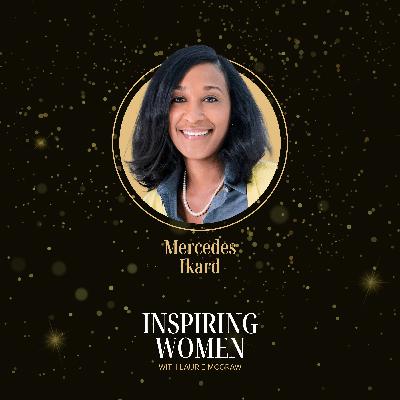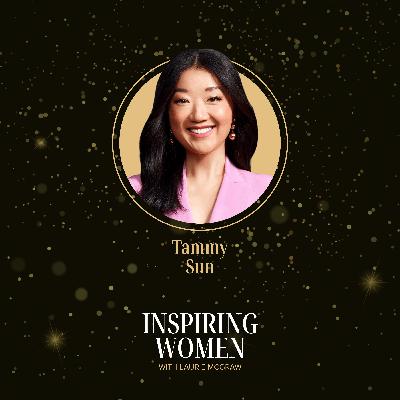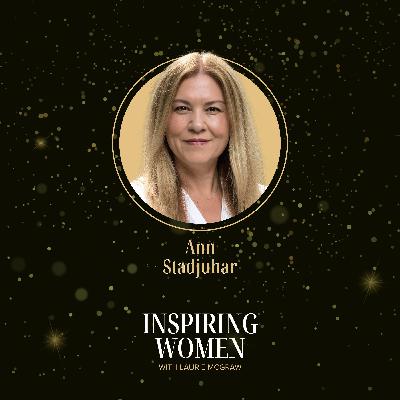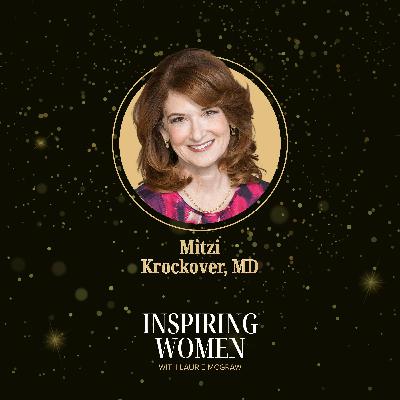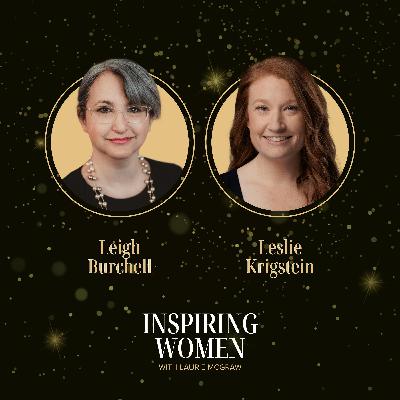Discover Inspiring Women with Laurie McGraw
Inspiring Women with Laurie McGraw

Inspiring Women with Laurie McGraw
Author: Laurie McGraw
Subscribed: 9Played: 80Subscribe
Share
© 2025 Laurie McGraw. All rights reserved.
Description
Advancing women to healthcare leadership–
and keeping them there.
Women comprise 70% of the healthcare workforce. They hold just 20% of the C-suite.
Each week, host Laurie McGraw bridges that gap through conversations with the women rewriting healthcare’s leadership playbook.
235 Episodes
Reverse
"When you do your homework... when you can speak to the facts... they stop and they listen."
In this episode of Inspiring Women, Laurie McGraw sits down with Kristy Whitehurst, the powerhouse behind the employee benefits strategy at Genuine Parts Company (GPC). Managing the well-being of over 60,000 members across a global landscape is no small feat, yet Kristy has navigated this complex "puzzle" for over two decades.
Kristy opens up about her unconventional start—from a degree in dietetics to becoming a leading voice in HR. She shares the raw reality of rising through the ranks in a male-dominated industry, the nerve-wracking moment of her first executive presentation, and why "owning your mistakes" is the ultimate catalyst for growth.
Whether you are looking to scale the corporate ladder, master the art of data-driven persuasion, or find the balance between professional passion and personal life, Kristy’s "Maiden Voyage" into the podcast world provides a blueprint for sustainable, high-impact leadership.
In this episode, we discuss:
The strategy of managing benefits for a global workforce of 60,000+.
How to command respect and "stop the room" in male-dominated boardrooms.
The "Puzzle of Benefits": Balancing rising costs with employee retention.
Why asking the "simple" questions is a leader's greatest superpower.
Navigating corporate evolution, M&A, and the future of AI in healthcare.
The importance of mentorship and watching how the "greats" prepare for the big moments.
"We’ve been conditioned to fear our food, but the 'health halo' is the biggest deception of all."
Caroline Susie is not your average dietitian.
From the Today Show to the boardrooms of the world’s largest corporations, she has become one of the most influential voices in nutrition. But her message is often met with shock: she believes "all foods fit" and that much of what we’ve been told about "fake food" and organic labels is marketing, not science.
In this raw and wide-ranging conversation, Caroline sits down with Laurie McGraw to dismantle the myths that keep us stressed at the grocery store.
She addresses why "conventionally grown" produce is safer than you think and why the "health halo" around organic products might be emptying your wallet without improving your health.
Beyond the plate, Caroline reveals the high-stakes world of corporate health consulting at Mercer. She breaks down the "miracle" GLP-1 weight-loss drugs—balancing the clinical life-changing benefits with the cold, hard economics of a $1,000-a-month habit that most people are destined to fail.
We discuss:
The Strawberry Myth: Why you could eat 650 servings and still be safe.
The "Fake Food" Trap: Why she chooses real butter and real cheese over "healthy" alternatives.
The GLP-1 Crisis: Why the weight comes back faster—and worse—once you stop.
Doing Nothing is Disruption: The bold leadership move required to save the healthcare system.
Leaving a Toxic Boss: How a "hard pass" turned into a decade-long career transformation.
This is a masterclass in nutrition, corporate strategy, and the courage to speak the truth in an industry built on confusion.
My Roadmap for Leadership in 2026
Host: Laurie McGraw
Welcome to our very first episode of 2026! As I step into this new year, both in my role at Transcarent and as the host of this podcast, I’ve been thinking deeply about one word: Momentum. After more than 100s of conversations with incredible trailblazers, I’m dedicated to exploring how more inspiring women shape the world, and their businesses!
I’m so glad you’re here with me.
We will be dropping episodes every Tuesday with a new guest.
Cara Munnis was wearing an N95 mask while taking care of her daughter with norovirus all night because she had a critical meeting the next day and "I cannot get this thing." She showed up, ran the meeting, and afterward couldn't tell if anyone noticed she was operating on "one brain cell processing everything." Welcome to being a Chief Product Officer and a mom.
Here's what most people don't know about the CPO role: it has the shortest tenure of any C-suite position—less than half that of other executives. You're supposed to be "Switzerland," the neutral party among competing stakeholders. But you're constantly telling your C-suite peers—very kindly—why their ideas are going to sink or swim. The real transformation wasn't navigating those politics. It was what happened when Cara's daughter was born seven years ago. "For someone who's led massive technology transformations multiple times, it's very ironic how hard this transition was for me." The evening checkboxes—that sacred 5-8pm window where she prepared for the next day—vanished instantly. It took five years to build a new operating system where she hired without compromise and delegated with her eyes closed.
In this conversation, Cara explains why she's "obsessed" with finding the economic denominator, why Conway's Law means your product will mirror your org structure, and why staying close to technology was the best career advice she ever got. After describing her relentless discipline and surgical precision, she deadpans: "I haven't been fired yet, so I dunno, I guess it's okay." This is a masterclass in product leadership that scales, parenting that doesn't apologize, and ruthless prioritization when you're scraping for minutes in your day.
Key Takeaways:
How to choose the right ladder to climb—make career decisions based on intentionality, not just opportunity or speed
How to turn constraints into leadership advantages—use the pressure of working parenthood to force yourself to hire without compromise and delegate with confidence
How to stay close to technology in any role—even as a non-technical leader, understanding architecture helps you defend budgets, win deals, and articulate competitive advantages
How to shift your communication style as you move into executive roles—listen more, ask questions even when you know the answer, and bring others along instead of leading with your opinion
How to design org structures that create better products—use Conway's Law (products mirror internal communication structures) to intentionally build teams that will produce the outcomes you want
About the Guest:
Cara Munnis is Chief Product Officer at Care Lumen and Operating Partner at Newfire Global Partners, bringing over 15 years of healthcare technology product leadership to organizations navigating the intersection of clinical outcomes and business results. She spent six years at Amwell advancing from Senior Director to VP of Product Management, previously served as Head of Product for Digital Health at Blue Shield of California, and held leadership roles at Iora Health and Best Doctors. With a pre-med degree from College of the Holy Cross and an MBA from Bentley University, Cara is Pragmatic Marketing Certified – Level III and known for her ability to balance strategic product vision with rigorous execution while fostering collaborative team environments.
Chapters
[Placeholder for Chapters]
Guest & Host Links
Connect with Laurie McGraw on LinkedIn
Connect with Cara Munnis on LinkedIn
Connect with Inspiring Women
Browse Episodes | LinkedIn | Instagram | Apple | Spotify
Women comprise 75% of the healthcare workforce and make the majority of family healthcare decisions—yet hold only 20% of senior leadership positions. Dr. Amy Compton-Phillips, Executive Vice President and Chief Medical Officer of CVS Health, sees this gap as more than unfair.
At CVS Health, Dr. Amy oversees clinical strategy for 9,000 community access points with a clear mission: simplify healthcare and make the right thing the easy thing. "We've put things like electronic medical records, narrow insurance networks, and administrative rigmarole between patients and people who can help them," she explains. "How can we start taking layers out?"
But she didn't reach this role by following the traditional playbook. She turned down her dream job because the timing wasn't right for her family. She went part-time during peak career years, trading off with her husband as their priorities shifted. And she's consistently been tapped on the shoulder for opportunities rather than raising her hand, which taught her that doing your current job exceptionally well matters more than constantly positioning for the next one.
In this conversation, Dr. Amy explains why healthcare needs women's voices at the executive table for design thinking that actually works, how she and her husband negotiated dual careers through different life stages, why "performance gets you the podium" but authenticity and strategic thinking get you the C-suite, and what it takes to be heard when you're the only woman in leadership rooms. Whether you're balancing clinical practice with administrative responsibilities, navigating when to say yes and no to opportunities, or building toward senior healthcare leadership, this is uncommon honesty about the trade-offs and strategies that actually matter.
Key Takeaways:
Do your current job exceptionally well—performance gets you noticed before you ever raise your hand
Design healthcare systems with women's voices at the table; they're both the workforce majority and primary family decision-makers
Negotiate career trade-offs with your partner over time; one person doesn't have to sacrifice permanently
Saying no to your dream job might be the smartest move you make—if they value you, they'll come back
Taking layers out of complexity requires intentional design thinking, not just adding more solutions
Figure out what's working and what's not, then adjust your strategy—sometimes you need to literally or metaphorically elevate yourself to be heard
About the Guest: Dr. Amy Compton-Phillips is Executive Vice President and Chief Medical Officer of CVS Health, where she leads clinical strategy across 9,000 community locations. She previously served as President and Chief Clinical Officer at Providence, a $25 billion health system with 52 hospitals and 120,000 caregivers, where she led the response to the first confirmed COVID-19 case in the United States. Earlier, she spent 22 years at Kaiser Permanente, rising from front-line internist to Chief Quality Officer. A CNN Medical Analyst and keynote speaker, she has served on boards including HIMSS, the Institute for Systems Biology, and Wellcare. She holds her bachelor's degree from Johns Hopkins University and her medical degree from the University of Maryland School of Medicine.
Health Podcast Network
Chapters
00:00 - Introduction and Holiday Health Tips
02:38 - Simplifying Health at CVS
05:31 - The Voice of the Customer: Women in Leadership
08:42 - Career Progression: Being Tapped on the Shoulder
10:11 - Saying No to the Dream Job
12:39 - Making Choices: Work-Life Integration
15:05 - Going Part-Time and Life Partner Negotiation
17:55 - Pull Out the Platform Shoes: Getting Heard as a Leader
Guest & Host Links
Connect with Laurie McGraw on LinkedIn
Connect with Dr. Amy Compton-Phillips on LinkedIn
Connect with Inspiring Women
Browse Episodes | LinkedIn | Instagram | Apple | Spotify
"I thought I understood healthcare—until I had cancer."
Beth Ratliff had spent her entire career in healthcare operations. She'd built multi-site clinical systems, led digital transformations, and risen from physical therapist to C-suite executive. But when she was diagnosed with colon cancer, she discovered something that would fundamentally change how she leads. And it had nothing to do with clinical protocols or operational efficiency.
Today, as Chief Operating Officer of Premise Health, Beth has built a reputation in Nashville's male-dominated healthcare executive world for an approach that shouldn't work, but does. She talks openly about being in recovery for 30 years. She shares her cancer journey in board meetings. And somehow, this vulnerability hasn't weakened her position; it's made her one of the most influential operators in the industry.
There's something Beth figured out early in her career that most leaders miss: the moment when you realize you're not the best clinician in the room is exactly when you're ready to lead. What she learned on a Toyota manufacturing floor as a young physical therapist became the foundation for a leadership philosophy that combines systems thinking with something that can't be taught in business school but can be learned through lived experience.
In this conversation, Beth reveals how she's navigated being consistently underestimated, why she applied for jobs she wasn't qualified for, and what changed in those terrifying moments coordinating her own cancer care that transformed her entire approach to building healthcare organizations. This isn't inspiration about overcoming adversity. It's a masterclass in strategic authenticity from someone who's figured out how to use her platform without making it about herself.
Key Takeaways:
How to turn being underestimated into your competitive advantage in male-dominated executive spaces
The career strategy Beth used to land leadership roles she wasn't "technically qualified" for—and why more women need to do the same
What Beth learned on Toyota's factory floor that transformed how she thinks about healthcare leadership
Beth's framework for sharing deeply personal experiences without making it about yourself—and why this matters for organizational impact
Why patient care technology keeps failing—and the missing ingredient that actually changes outcomes
The unconventional way Beth built her advisory board using both real executives and AI-powered mentors
How Beth gets her entire organization aligned when everyone claims competing priorities are equally important
The critical difference between mentors and sponsors—and how to cultivate both strategically
About the Guest:
Beth Ratliff is Chief Operating Officer at Premise Health, where she oversees clinical operations, technology integration, and business processes for a nationwide healthcare organization serving employer clients. She started her career as a physical therapist on Toyota's manufacturing floor, where she learned the process improvement discipline that would eventually take her to the C-suite. Beth is a Nashville Health Care Council Fellow, a colon cancer survivor, and has been openly in recovery for 30 years—leading Premise Health to become certified as a recovery-friendly workplace where personal challenges become professional superpowers.
Chapters
00:00 - Introduction at Nashville
01:43 - Succeeding as the Only Woman in the Room
04:09 - From Physical Therapist to Power Broker
07:17 - Learning from Cancer: The Patient Experience
10:30 - Recovery Friendly Workplace and Personal Journey
16:10 - The Growing Onsite Clinic Movement
18:32 - Ruthless Prioritization as a Leader
22:08 - Building Your Personal Board of Advisors
Guest & Host Links
Connect with Laurie McGraw on LinkedIn
Connect with Beth Ratliff on LinkedIn
Connect with Inspiring Women
Browse Episodes | LinkedIn | Instagram | Apple | Spotify
Kristi Henderson invented telehealth at the University of Mississippi Medical Center decades before anyone thought healthcare needed it.
While her colleagues were optimizing traditional clinic workflows, Kristi was asking a different question: What if geography didn't dictate healthcare access? By the time the pandemic forced everyone else to figure out virtual care overnight, she'd already spent two decades perfecting it. What makes her approach distinctive isn't just her track record at Amazon, Ascension, and Optum. It's that she worked every level of the healthcare system for 24 years before reaching the C-suite. She understands frontline friction because she lived it.
At Amazon, Kristi discovered a framework that changed everything: one-way doors versus two-way doors. Some decisions are irreversible and demand precision. Others are experiments where failure means pivoting fast. That distinction became her playbook for tackling problems most leaders won't touch. But her most counterintuitive move? When she became CEO of Confluent Health, her first hire wasn't a CFO or COO. It was a leader for internal communications. Because brilliant transformation plans fail without deliberate stakeholder engagement. Change happens at the speed of trust.
Now Kristi is betting on something that sounds almost naively optimistic: that AI will finally give clinicians their time back by eliminating friction, not replacing human connection. She uses AI daily as her "sidekick" and is building an organization where technology supercharges what only humans can do.
Key Takeaways:
Why Kristi kept raising her hand for jobs no one else wanted and how taking the hardest assignments became her competitive advantage
The Amazon framework that changed everything: one-way doors versus two-way doors, and how to know which type of decision you're making
What "change happens at the speed of trust" actually means in practice when you're transforming organizations
Kristi's "reverse innovation" approach: why bottoms-up transformation consistently outperforms top-down mandates
The counterintuitive first hire Kristi made as CEO, and why communication infrastructure matters more than most leaders realize
How to handle naysayers strategically instead of avoiding them or trying to convince them
Why Kristi believes the workforce crisis isn't permanent if leaders focus on the right problem
The specific ways Kristi uses AI daily as a CEO, and why she sees it as the key to bringing joy back to clinical practice
About the Guest
Kristi Henderson, DNP, is CEO of Confluent Health, a family of physical therapy and occupational therapy companies. She spent the first 24 years of her career as a practicing nurse practitioner before pioneering telehealth at the University of Mississippi Medical Center, long before the pandemic made it mainstream. Kristi has since led digital transformation at Ascension Health, built clinical operations for Amazon Care, and served as CEO of Optum Everycare. She's Board Chair of the American Telemedicine Association and affiliate faculty at Dell Medical School and the University of Washington School of Nursing. Her career has been defined by raising her hand for challenges others declined and building tech-enabled care models that improve outcomes while reducing clinician burden.
Chapters
00:00 - Introduction at Confluent Health
01:57 - From Bedside to Boardroom: The Leadership Journey
06:10 - Amazon Care Lessons: One-Way vs Two-Way Doors
11:07 - Change Happens at the Speed of Trust
14:11 - Overcoming Naysayers: The Early Days of Telehealth
19:11 - Bringing Joy Back to Medicine
22:56 - AI Hacks and Daily Innovation
Guest & Host Links
Connect with Laurie McGraw on LinkedIn
Connect with Kristi Henderson on LinkedIn
Connect with Inspiring Women
Browse Episodes | LinkedIn | Instagram | Apple | Spotify
What if your biggest career advantage didn't come from your wins, but from the projects that didn't go as planned?
Missy Krasner's career includes some of the boldest bets in healthcare: Google Health, Amazon Care, Box's healthcare vision. None went the way she originally envisioned. And she wouldn't change any of it. Because what she extracted from those experiences—being inside big tech's most ambitious healthcare ventures—gave her something more valuable than a conventional win: a clear understanding of what it actually takes to make change stick in the most regulated, fragmented industry in America.
Now, as co-founder of Penguin AI, Missy is applying those hard-won insights to tackle the trillion-dollar administrative burden crushing healthcare. But this isn't another AI hype story. Missy has been at the forefront of healthcare innovation for over 20 years. She was building Google Health before meaningful use existed. She was evangelizing platform thinking when electronic health records were still competing with manila folders. She's witnessed three watershed moments transform the industry: meaningful use driving EHR adoption, COVID accelerating telehealth adoption, and now AI. And she believes this moment is fundamentally different.
Why Missy's experiences at Google, Amazon, and Box taught her more about healthcare transformation than conventional success ever could
What's really happening with the trillion-dollar administrative burden and how AI can finally address it at scale
Why the current political and economic disruption will accelerate consumer-driven healthcare innovation
Missy's candid assessment of the headwinds facing women leaders right now and what it means for advancement
Why "nobody's coming to save us" and what that means for how women need to show up in leadership
What fuels Missy after decades of innovation and her advice for anyone trying to push through when it's hard
About the Guest: Missy Krasner brings 35+ years of healthcare experience spanning big tech (Amazon, Google, Box), government (helped launch the Office of the National Coordinator for Health IT), venture capital (Canvas Ventures, Redesign Health), and now as co-founder of Penguin AI, which recently closed a $30 million Series A. She serves on multiple digital health boards including Uplift, Overalls, and Syntax, and holds degrees from Stanford (M.A.) and UCLA (B.A.).
Chapters
00:00 - Introduction at Health Conference
01:14 - Journey Through Google, Box, and Amazon
02:53 - Three Watershed Moments in Healthcare
06:59 - Penguin AI and the Trillion-Dollar Administrative Burden
10:34 - Women Healthcare Leaders for Progress Reflection
14:15 - Finding Innovation Opportunities in Chaos
16:45 - Advancing Women in Leadership
22:13 - Learning from Failure and What Drives Success
Guest & Host Links
Connect with Laurie McGraw on LinkedIn
Connect with Missy Krasner on LinkedIn
Connect with Inspiring Women
Browse Episodes | LinkedIn | Instagram | Apple | Spotify
Medicare spends as much on falls as it does on cancer—but 30-50% of those fall-related costs are preventable. Amanda Rees watched her grandmother develop a "goose egg" from a fall while gardening, then watched the shame make her stop gardening altogether, spiraling into depression and isolation. A decade of caregiving radicalized how this Princeton-trained engineer thought about aging. So she built Bold, a company now serving 10 million older adults—with a leadership team and cap table that's "very, very female" in a notoriously male-dominated space. But first, she had to stop making herself small.
"You're really good at making yourself seem small," someone told Amanda early in her fundraising journey. The irony wasn't lost—she was downplaying a Princeton engineering degree, $100M in energy investment experience, and a decade caring for her grandmother while running a company literally called Bold. She only needed to hear that feedback once.
What followed was a masterclass in building with intention. Amanda raised funding from Rethink Impact, the largest fund dedicated to investing in women, and assembled a predominantly female leadership team—not through quotas, but through mission alignment. "Women tend to be the frontline caregivers for a lot of families, and they see it. They understand that's a very real problem," she explains.
In this conversation, Amanda dismantles the preparation myth holding women founders back: "If you have the itch and you wanna do it, do it. Don't go get an extra degree or do this thing before I'm ready." She explains why your first pitch will be terrible, why pitch five is the hardest, and how objection handling refines not just your deck but your entire business model. She also shares why she only hires people who'll stay "when things are tough, when the challenges ahead look really big and scary"—because fair-weather teams crumble, and resilience must be embedded from day one.
Key Takeaways:
Stop waiting to be "ready"—the best data comes from actually doing it, not preparing endlessly
Making yourself small doesn't help anyone, especially not you—authenticity beats false modesty
Build your team and investor base with people who deeply connect to your mission, not just the opportunity
Your first pitch will suck; by pitch fifty you'll be excellent—you just have to survive pitch five
The DNA of the people you hire becomes the DNA of your company—choose accordingly
When older adults lose independence, it's the shame and isolation that does the damage, not just the physical limitation
About the Guest: Amanda Rees is the CEO and Co-founder of Bold, a pro-aging health company serving over 10 million older adults through Medicare partnerships with organizations like UnitedHealth Group. Bold's platform has demonstrated a 46% reduction in falls and 182% increase in weekly physical activity in peer-reviewed research. A Princeton graduate with a degree in biological and chemical engineering, Amanda previously managed a $100M renewable energy portfolio at The Schmidt Family Foundation and has been selected for The Aspen Institute's 2025 class of Finance Leaders Fellows.
Health Podcast Network
Chapters
00:00 - Introduction at Health Conference
00:55 - From Caregiver to Founder: The Bold Origin Story
03:35 - Keeping Humanity in Fall Prevention
08:12 - Building a Female-Led Company and Cap Table
10:08 - Fundraising Advice: Just Start Pitching
13:41 - The Feedback That Changed Everything: Stop Making Yourself Small
15:21 - AI and the Future of Aging
16:52 - Building Your Team: The DNA of Your Company
Guest & Host Links
Connect with Laurie McGraw on LinkedIn
Connect with Amanda Rees on LinkedIn
Connect with Inspiring Women
Browse Episodes | LinkedIn | Instagram | Apple | Spotify
At nine years old watching a presidential debate, Shefali Razdan Duggal realized something: in America, a peanut farmer and the son of divorced parents could become president. Her mother was cutting vegetables at night, working as a seamstress by day. Politics became the path to help people like her mother.
Decades later, she became the first person of color to serve as U.S. Ambassador to the Netherlands, where the Dutch named a fuchsia-pink tulip after her, the first ambassador from any country ever honored this way. But the journey between that childhood revelation and diplomatic triumph involved a different calculation entirely.
"Women of color have to work four times as hard," Shefali states. Her response wasn't resentment—it was a choice. She calls it "weed whacking" for the people behind her.
While serving 90-hour weeks, she operated from what she calls "complete and utter equality" with her entire embassy staff. The result? Her Marines ranked as one of the best detachments in Europe. Her embassy became one of the best-run on the continent. And when women of color visited the ambassador wall and saw her photo next to John Adams, they would start crying.
In this conversation, Shefali explains why ego kills opportunities faster than anything else, how she managed crushing stress without punishing anyone around her, and what happens when you choose to "do something" instead of "be someone." She also reveals why your work may not benefit you immediately—but that's actually the point.
Key Takeaways:
Why working harder (when you shouldn't have to) clears the path for everyone behind you
How to build relationships before you need them
What "lift as you climb" actually looks like in practice
Why starting at the base level with zero ego changes everything
How to manage stress without taking it out on your team
When your work benefits someone else instead of you—and why that matters
About the Guest: The Honorable Shefali Razdan Duggal served as U.S. Ambassador to the Kingdom of the Netherlands from 2022-2025, becoming the first person of color in this role. Born in India and raised in Cincinnati, Ohio by a single mother working multiple minimum-wage jobs, she began her political career volunteering on Senator Ted Kennedy's campaign. The Dutch honored her by naming a tulip "Tulipa Shefali"—the first ambassador from any country to receive this tribute. Her book about her journey from immigrant daughter to diplomat releases summer 2026.
Chapters
00:00 - Introduction at Health Conference
02:17 - From Humble Beginnings to Public Service
05:08 - Starting at the Bottom: Early Campaign Work
07:39 - Working Four Times as Hard: Breaking Barriers
09:51 - Lifting as You Climb: Human Rights Commitment
15:15 - Learning Diplomacy: The Path to Ambassador
19:06 - EQ and IQ: Leading with Humanity Under Pressure
26:48 - Advice for Women and What's Next
Guest & Host Links
Connect with Laurie McGraw on LinkedIn
Connect with Former Ambassador Shefali Razdan-Duggal on LinkedIn
Connect with Inspiring Women
Browse Episodes | LinkedIn | Instagram | Apple | Spotify
"As a physician in training, we have been trained to believe that we are the leaders of every team. That we should know more than anyone in the room, or we must not be a good doctor. Throw that out."
Dr. Saria Saccocio spent months during COVID not sleeping, trying to solve every problem herself while managing care for 1.3 million people. She was drowning under the weight of leadership until she had an epiphany that would fundamentally change how she leads: "Maybe I don't have to have all the answers myself. Perhaps I'm not the only one who comes up with solutions." That realization—that her medical training had actually taught her the wrong leadership model—became the foundation of her approach as Chief Medical Officer of Essence Healthcare. Five years later, she describes watching her team shift "from a brain drain to a recharge," becoming one of the most creative and innovative teams she's ever led.
Dr. Saccocio's leadership philosophy centers on what she calls "let go and lead"—a mantra she returns to whenever anxiety creeps in. "Leading is not always directing," she explains. "Leading is inspiring, empowering and enabling everyone to sit at the table, speak up, show up, and do things. Build everyone else's confidence." After a year with Essence, she's most proud not of her own decisions but of "the work that they do, the creativity that they have now that they're working across swim lanes and doing things together." This approach hasn't just prevented burnout—it's unlocked innovation. From eliminating prior authorizations through physician collaboration to providing Oura rings to Medicare Advantage seniors, Essence Healthcare's solutions emerge from empowered teams, not top-down mandates.
What makes Dr. Saccocio's perspective particularly powerful is her refusal to abandon clinical practice. After two decades as a family physician, she still sees patients at a free clinic, maintaining what she calls "a sacred relationship" that keeps her grounded in the vulnerability patients experience. Her closing advice to women leaders is deceptively simple but hard-won: "Don't forget to be you. Let's stop trying to be someone else. You are at that table because you are you. Bring your whole self to work. Bring your whole self wherever you go."
Key Insights:
Why physician training teaches the wrong leadership model—and how to unlearn it
How "let go and lead" prevents burnout while unlocking team creativity
Why continuing clinical practice makes you a better executive leader
The shift from brain drain to recharge: building teams that energize each other
How to lead without directing: inspiring, empowering, and enabling others
Why bringing your whole self to work is the most revolutionary leadership act
The connection between seeing whole people as patients and leading whole people as teams
About the Guest: Dr. Saria Saccocio is Chief Medical Officer at Essence Healthcare, a 21-year-old regional Medicare Advantage plan with consistently high star ratings. A practicing family physician for over two decades, she previously held leadership roles at CareMore Health, Elance Health, Securas, Carilion Health, and LifePoint Hospitals. She continues seeing patients at Greenville Free Medical Clinic. Recorded live at Nashville Sessions conference.
Health Podcast Network
Chapters
00:00 - Redefining Physician Leadership
01:11 - Why ESSENCE Healthcare
04:04 - Navigating Medicare Advantage Disruption
12:35 - Why She Still Practices Medicine
18:33 - OURA Rings and Digital Health Literacy
24:28 - Leadership Evolution: The COVID Moment
29:33 - Bring Your Whole Self to Work
Guest & Host Links
Connect with Laurie McGraw on LinkedIn
Connect with Saria Saccocio on LinkedIn
Connect with Inspiring Women
Browse Episodes | LinkedIn | Instagram | Apple | Spotify
"Get us re-listed. You have 12 months."
When Crissy Carlisle walked into HealthSouth in 2005, the FBI had already raided the building. The company held the distinction of being one of the largest frauds in American history. She filed six years' worth of 10-Ks in 12 months, deploying such autocratic leadership that she earned the label "dictator." Then she did something remarkable: she spent the next two years consciously rebranding herself.
This is the story of a leader who refuses to be defined by crisis or constrained by labels. From PricewaterhouseCoopers to Summit Behavioral Healthcare, Carlisle has built a career on walking into impossible situations and transforming them through strategic vision and radical self-awareness. Her secret? Understanding that even when you deploy the right leadership style, there are consequences. And having the courage to evolve anyway.
"I went from chicken little to now people say, 'How do you stay so calm in these situations?' My response is generally: years of practice."
Today, as CFO of Summit Behavioral Healthcare, Carlisle brings decades of high-stakes experience to behavioral health's most pressing challenges. But her most powerful lesson came from managing an accounts payable team who taught her that while some people are motivated by promotions, others just want to wear jeans. The revelation changed everything about how she builds and leads teams.
In this episode of Inspiring Women with Laurie McGraw, discover why removing "I don't have time" from your vocabulary might be the most important leadership decision you make. From being the only woman at investor conferences to consciously surrounding herself with people who think nothing like her, Carlisle reveals how strategic leadership isn't about having all the answers. It's about asking better questions.
For Crissy Carlisle, leadership isn't about getting rich and famous. It's about serving patients well and knowing everything else will follow. In a healthcare system desperate for strategic financial leadership, she's proof that the best CFOs don't just manage costs. They reimagine what's possible.
Key Insights:
Why deploying autocratic leadership successfully still required two years of rebranding
How managing accounts payable taught her more about leadership than managing MBAs
The mental shift from "I don't have time" to "That's not a priority today"
Why finding common ground through Alabama football changed everything
How to build teams with people who think nothing like you
About the Guest: Crissy Carlisle serves as CFO of Summit Behavioral Healthcare, bringing 30+ years of experience from PricewaterhouseCoopers, HealthSouth (now Encompass Health), and taking companies public. She navigated one of the largest corporate frauds in American history, transforming from "dictator" to strategic visionary through conscious leadership evolution. Her personal mission: walk by faith, give with a generous heart, and make a difference in the lives of others.
Health Podcast Network
Chapters
00:00 Introduction
3:06 From Auditor to Healthcare CFO
5:44 Leadership Lessons from HealthSouth
6:54 Rebranding After 'Dictator' Label
10:08 Choosing to Change Your Leadership
14:00 Building Diverse-Thinking Teams
15:51 Being the Only Woman in the Room
19:53 Priorities Over Excuses
21:49 Career Advice: Assess, Learn, Build
Guest & Host Links
Connect with Laurie McGraw on LinkedIn
Connect with Crissy Carlisle on LinkedIn
Connect with Inspiring Women
Browse Episodes | LinkedIn | Instagram | Apple | Spotify
"What's the problem we're trying to solve? Because oddly enough, sometimes that's not really understood."
Before Mercedes Ikard solves a problem, she asks a question most leaders skip: Are we even solving the right problem? In a world demanding immediate action, she's built her leadership on something more powerful: the discipline to pause, listen, understand, and ensure everyone's calibrated on what actually matters before moving forward. As Senior Director of US Benefits Operations at The Walt Disney Company, Mercedes leads benefits strategy for one of the world's most complex workforces—six generations, cast members in theme parks and executives in boardrooms, each with different needs. For Mercedes, this complexity requires constant calibration.
"Empathy I think is important. And I think it's important to be a decent human. If we start out to be a decent human, that really is a good barometer and we really make decisions a lot easier." This is where calibration begins. Not with spreadsheets or plan designs, but with a fundamental check: Are we being decent humans? When issues explode in the cultural ethos, Mercedes does a gut check: Is this really an issue within this organization? She's learned to calibrate signal from noise, solving problems that actually impact her workforce rather than chasing topics du jour.
In this episode of Inspiring Women with Laurie McGraw, discover why constant calibration might be leadership's most powerful skill. Not as hesitation, but as disciplined checking that everything stays aligned with what actually matters. From bifurcating work and home with precision to extending grace in postmortems, Mercedes has built her career on understanding before acting, clarity before speed, grace before perfection. Her superpower isn't speed. It's the wisdom to calibrate constantly on the right problems, with empathy, and with grace.
Key Insights:
Why "what's the problem we're trying to solve?" eliminates most organizational chaos
How listening to understand rather than respond creates scalable solutions
The discipline required to separate workforce-relevant issues from topics du jour
Why plain language and "side streets" serve six generations better than complex plan details
How bifurcating your day prevents the exhaustion of never decompressing
Why showing yourself grace isn't optional for sustainable leadership
About the Guest: Mercedes Ikard serves as Senior Director of US Benefits Operations at The Walt Disney Company, leading benefits strategy for one of the world's most complex and diverse workforces. Her leadership philosophy centers on calibration: constantly checking that she's solving the right problems, leading with empathy, and extending grace to herself and others navigating the high-pressure demands of corporate leadership.
Health Podcast Network
Chapters
0:00 Intro
2:05 Why Benefits Leadership Matters
4:03 Finding Her Passion in Healthcare and Retirement Benefits
6:59 Managing Disney's Multigenerational Workforce
10:42 Problem-Solving Framework for Complex Workforce Challenges
13:26 Leadership Skills That Matter: Empathy and Listening
15:03 The Power of Processing: Resisting the Urge to Act Immediately
18:29 Work-Life Balance and Decompression Strategies
21:11 Career Advice: Be Yourself and Show Grace
Guest & Host Links
Connect with Laurie McGraw on LinkedIn
Connect with Mercedes Ikard on LinkedIn
Connect with Inspiring Women
Browse Episodes | LinkedIn | Instagram | Apple | Spotify
"I had no idea. I didn't know what an HSA was, all the acronyms—HRA, HSA, HDHP, ERISA. I really had to learn all of that."
When Tammy Sun pitched her fertility startup a decade ago, the category she was building didn't exist. Investors dismissed it as a lifestyle business, a niche play unworthy of venture capital. After 99 rejections, she raised her first million. Today, Carrot Fertility operates in 170 countries, serving millions in a market that didn't even have a name when she started.
This conversation arrives at an inflection point. Women over 40 represent the only demographic having more babies, while one in six couples confronts infertility—a number experts believe vastly undercounts reality since you're only counted if you can afford to seek care.
Sun saw these contradictions not as obstacles but as opportunities. Without a male co-founder, without prior startup experience, without even knowing basic healthcare acronyms, she built one of the most valuable fertility companies in the world. Her secret wasn't expertise. It was embracing what she didn't know.
"Having a beginner's mind and coming in with curiosity and excitement and imagination around the art of what is possible—I can't think of an area of the world that needs it more now than healthcare", Sun explains.
From that first million that was "the hardest million dollars I ever raised" to expanding beyond fertility into what she calls "post reproductive fertility care" with their menopause product—which became their fastest growing product ever—Sun has earned the right to her radical advice about imposter syndrome: "You can totally ignore it. You can pretend like it doesn't exist, and you can just act the way that you feel like you should act."
In this episode of Inspiring Women with Laurie McGraw, discover how a non-professional founder transformed a personal fertility crisis into a global healthcare platform. From recognizing that "half of all infertility is related to male factor" to launching Sprints at the nexus of metabolic and fertility care, Sun reveals why the future of women's health isn't about incremental improvements to a broken system. It's about having the audacity to imagine something entirely new.
For Tammy Sun, building in the space between naivete and expertise isn't a disadvantage. It's the only way to create categories that don't yet exist. In a world where knowing too much can blind you to what's possible, she's proof that sometimes the best qualification for changing healthcare is not knowing why it can't be changed.
Key Insights:
Why the fastest-growing fertility demographic reveals everything about modern family planning
How embracing ignorance became a competitive advantage in healthcare innovation
The hidden truth about male factor infertility that affects half of all cases
Why imposter syndrome is a luxury founders can't afford
How moving from California to Arkansas changed everything
What GLP-1s mean for the future of fertility and healthcare
About the Guest: Tammy Sun is the Founder and CEO of Carrot Fertility, now operating in almost 170 countries after starting with 12. Without prior founder experience or healthcare expertise, she transformed a personal fertility journey into a category-defining company. She built Carrot into one of the most valuable fertility platforms globally, expanding from fertility into menopause and metabolic fertility care.
Chapters
2:03 The State of Women's Health and Political Landscape
4:51 Origin Story: Building a Category from Scratch
8:01 Fertility Trends and the Education Gap
11:41 Raising the First Million: The Founding Journey
15:11 Embracing the Beginner's Mind in Healthcare
16:41 The Future: From Fertility to Lifelong Care
22:38 Advice for Women Founders: Throwing Away Imposter Syndrome
Guest & Host Links
Connect with Laurie McGraw on LinkedIn
Connect with Tammy Sun on LinkedIn
Connect with Inspiring Women
Browse Episodes | LinkedIn | Instagram | Apple | Spotify
"By 2030, 2035, they're saying we're gonna have more older adults than children in this country. And if Medicaid cuts happen, where are people gonna get care? Their first resort is gonna be going to the emergency department."
Dr. Sarita Mohanty knows exactly what's coming—she sees it every shift in urgent care. As President and CEO of The SCAN Foundation, she's racing to transform how America ages while still practicing medicine because, as she puts it, "clinical work gives me an opportunity to really engage on the ground versus being at the 50,000 foot level."
Her non-linear journey from LA County General Hospital—where patients waited for days with lines wrapping around the building—through health plan leadership at LA Care and Kaiser Permanente, to now running a major philanthropy, taught her one crucial lesson: the system wasn't built for the people who need it most. Now, with potential Medicaid cuts threatening services like adult day health centers and in-home support, she's watching decades of progress hang in the balance.
"When everything costs money, many people just avoid going to see a doctor if they can," shares one older adult through The SCAN Foundation's "People Say" platform—a stark reminder of what's at stake.
In this episode of Inspiring Women with Laurie McGraw, Dr. Mohanty reveals:
Why she still practices urgent care despite running a major foundation ("I get to see how patients come in, what their challenges are")
The coming demographic crisis that will reshape America's healthcare system
How COVID proved what's possible when stakeholders drop their silos and move fast
Why she went back to business school with three small kids to transform her leadership
The power of elevating older adults' voices directly to policymakers
How impact investing can catalyze innovation when traditional approaches fail after 30 years
Her philosophy: "Leadership isn't about having all the answers, but by listening and collaborating"
"Medicine teaches you to avoid mistakes. But leadership requires you to take risks and sometimes fail forward," Dr. Mohanty reflects on her transformation from exam room to boardroom.
From treating uninsured patients at LA County to leading a foundation that's reimagining aging in America, Dr. Sarita Mohanty embodies the physician-leader who refuses to choose between ground-level care and systems change. At The SCAN Foundation, she's not just preparing for the silver tsunami—she's ensuring that when it arrives, America's older adults can age with the dignity, purpose, and support they deserve.
Her mission isn't just professional—it's personal. With three kids and an aging mother, she's fighting for the healthcare system she wants them to inherit. One where aging isn't a crisis, but a universal reality we're prepared to honor.
Chapters
03:35 - Still Practicing Medicine While Running a Foundation
05:33 - The Non-Linear Path from Physician to CEO
08:28 - America's Aging Crisis: More Seniors Than Children by 2035
10:05 - When Medicaid Cuts Hit: Real Impact on Real People
12:20 - Influencing Policy in Today's Political Environment
16:35 - Leading Differently: Doubling Down in Challenging Times
19:31 - Finding Energy When Optimism Seems Impossible
23:32 - Paying It Forward: Advice for Women Leaders
Guest & Host Links
Connect with Laurie McGraw on LinkedIn
Connect with Sarita Mohanty, MD, MPH, MBA on LinkedIn
Connect with Inspiring Women
Browse Episodes | LinkedIn | Instagram | Apple | Spotify
Approximately one in four people will face a cancer diagnosis. For most, the hardest part won't be the treatment itself but the waiting, the 3 AM questions, the logistical maze of care coordination that can mean the difference between hope and despair. Ann Stadjuhar knows this truth from both sides of the stethoscope.
When Ann navigated her own cancer diagnosis, she had every advantage: 20 years of healthcare expertise, knowledge of case volumes, connections to top surgeons at Optum. Yet even she found the system overwhelming. Her uncle in rural New Mexico wasn't as fortunate; by the time he reached MD Anderson, inadequate local care had sealed his fate. These parallel experiences crystallized Ann's mission at Reimagine Care: ensuring no one faces cancer alone, regardless of their zip code or insider knowledge.
This conversation comes at a critical moment. As cancer increasingly strikes younger populations, with many cancers now appearing in people's 20s and 30s rather than their 50s, we need innovators who understand that technology without empathy is just expensive machinery. Ann represents a new breed of healthcare leaders who see AI not as a replacement for human connection, but as a way to multiply it.
"The worst part of cancer is the wait," Ann explains. "We can be there 24/7 to understand whether there may be social determinants of health needs. I need a ride to treatment. I need someone to watch my dog. I have issues paying my electric bill. Sometimes people are honestly more comfortable telling the bot they're having these challenges."
After two decades revolutionizing digital health from women's health to pandemic response centers, Ann calls cancer care her "capstone." She's witnessed how the 18-month health system adoption cycle literally costs lives. Now, armed with Meta glasses and AI tools that multiply her capabilities "times four," she's racing against a broken system where your uncle's zip code shouldn't determine whether his cancer stays operable.
In this episode of Inspiring Women with Laurie McGraw, discover how one woman's journey through cancer transformed into a mission to democratize access to the kind of insider knowledge that can save lives. From the Cancer X Accelerator to Reimagine Care's AI companion REMI, Ann reveals why the future of cancer care isn't about choosing between humans and machines. It's about creating technology sophisticated enough to know that sometimes, the most advanced intervention is simply helping someone find a dog sitter so they don't miss chemotherapy.
For Ann Stadjuhar, reimagining cancer care isn't about replacing human connection. It's about multiplying it. In a healthcare system where staying curious might be the difference between innovation and stagnation, between treatment and tragedy, she's proof that the most powerful technology is the kind that remembers to be human.
Key Insights:
Why patients confess more to AI than to their doctors, and what that means for care
How social determinants of health become matters of life and death in cancer treatment
The hidden complexities even healthcare insiders struggle to navigate
Why the next generation needs emotional intelligence more than technical skills
How one woman's cancer diagnosis became a blueprint for system-wide change
About the Guest:
Ann Stadjuhar brings 20+ years of digital health innovation to her role as Chief Growth Officer at Reimagine Care. From launching pharmaceuticals to scaling population health tools, she's run what she calls "the gauntlet" of healthcare transformation. Her personal cancer journey while at Optum revealed the gaps even insiders face, inspiring her mission to ensure 24/7 companionship for every cancer patient through AI-powered human care.
Guest & Host Links
Connect with Laurie McGraw on LinkedIn
Connect with Ann Stadjuhar on LinkedIn
Connect with Inspiring Women
Browse Episodes | LinkedIn | Instagram | Apple | Spotify
Dr. Mitzi Krockover has been the first in every leadership role she's taken—from founding UCLA's Women's Health Center to becoming Humana's first Vice President of Women's Health to now investing in women-led healthcare companies. In this powerful conversation with Laurie McGraw, Dr. Krockover reveals why she's optimistic about women's health innovation despite recent funding challenges, sharing how the "train has left the station" on progress that can't be reversed.
Dr. Krockover breaks down the expansive definition of women's health beyond reproductive care—from the fact that 66% of Alzheimer's patients are women to how female inflammatory responses differ fundamentally from men's. She connects the dots between women's health investment and economic returns, citing studies showing a potential $14 billion ROI from modest research increases.
Key Takeaways:
Why women's health encompasses far more than reproductive health—and the three critical buckets every leader should understand
How the 1993 NIH Revitalization Act changed everything, yet we're still recovering from decades of exclusion
The economic case for women's health: from workforce retention during menopause to trillion-dollar market opportunities
Why Dr. Krockover sees women as investors, not just philanthropists, in health innovation
The career advice that shaped her path: "If it's not challenging you and scaring you a little, it's probably not worth doing"
From navigating being "the first" in multiple sectors to building Arizona's women's health innovation ecosystem, Dr. Krockover demonstrates how connecting the dots between health, economics, and leadership creates unstoppable momentum for change.
Chapters
00:00 - Intro
03:50 - Being the First: Navigating Uncharted Leadership Territory
05:44 - Beyond Reproductive Health: Redefining Women's Health
08:21 - From NIH Mandate to Investment Boom: 30 Years of Progress
11:22 - The Perfect Storm: Why Women's Health Finally Took Off
13:37 - Arizona's Women's Health Innovation Ecosystem
15:05 - From Treating Patients to Investing in Solutions
18:09 - Finding Optimism Despite Political Headwinds
23:09 - Say Yes First, Figure It Out Later: Advice for Women Leaders
Guest & Host Links
Connect with Laurie McGraw on LinkedIn
Connect with Mitzi Krockover, MD on LinkedIn
Connect with Inspiring Women
Browse Episodes | LinkedIn | Instagram | Apple | Spotify
Emmy-nominated journalist Julia Boorstin spent years interviewing thousands of executives before discovering something unexpected: the most successful women leaders had no playbook.
After 25 years covering business transformation at Fortune and CNBC, Julia set out to understand why women receive only 2% of venture capital despite outperforming their counterparts—and what she found changed everything she thought about leadership.
In this conversation with Laurie McGraw, Julia reveals insights from her book "When Women Lead" and the 60 extraordinary women who defied impossible odds. From wearing fake glasses to be taken seriously to discovering that gratitude correlates with long-term decision making, Julia unpacks why there's no single formula for female leadership success—and why that's exactly the point.
Key Takeaways:
Why vulnerability and transparency matter more than performed strength in uncertain times
The surprising link between gratitude and strategic long-term thinking
How "turning down your confidence" to gather information leads to better decisions
Why the data proves female-led companies outperform—returning profits a year earlier on average
The "water supply problem" approach that transforms how you solve any challenge
Why communal leadership isn't weakness—it's a statistical predictor of success
From the CNBC Changemakers list to her new podcast launching September 30th, Julia continues amplifying voices of women who are rewriting the rules of business.
Her message is clear: authenticity isn't about fitting a mold—it's about understanding your unique strengths and leading from that truth.
Chapter Markers
03:31 - Why Business Journalism Reveals Social Change
05:58 - The Myth of One Female Leadership Playbook
09:32 - Gratitude as a Strategic Leadership Skill
11:55 - Why Purpose-Driven Companies Outperform
14:12 - Leading Through Crisis with Data, Not Emotion
18:23 - Building the CNBC Changemakers Movement
22:08 - Finding the Water Supply Problem
25:29 - The Arbitrage Opportunity in Female Leadership
Guest & Host Links
Connect with Laurie McGraw on LinkedIn
Connect with Julia Boorstin on LinkedIn
Check out Julia's new podcast, CNBC Changemakers & Power Players: https://podcasts.apple.com/us/podcast/cnbc-changemakers-power-players/id1840209228
Connect with Inspiring Women
Browse Episodes | LinkedIn | Instagram | Apple | Spotify
"I bleed purple at work. I don't bleed Republican red or Democrat blue—I bleed purple, the color of my company."
When two of healthcare technology's most influential policy voices join forces, you get the unvarnished truth about how healthcare transformation really happens in Washington and beyond.
Leigh Burchell (VP Policy and Public Affairs at Altera Digital Health) and Leslie Krigstein (VP Communication & Government Affairs at Transcarent) have spent decades translating between Silicon Valley innovation and Capitol Hill regulation. Their combined influence has shaped everything from meaningful use to digital health adoption.
In this revealing episode, Leigh and Leslie discuss:
Why they're still counting clicks in 2025
Humanizing corporate interests while maintaining credibility
The delicate dance between innovation and regulation in the age of AI
Why "pledges" are back under Trump 2.0
How consumerization is revolutionizing healthcare
Being "the sharpest person in the room" while staying honest
"Every policy maker wants to talk about digital health," Leigh notes. "It's massively exploding at the state level too."
With AI "bullet training down the tracks," both women navigate the balance between enabling innovation and avoiding regulation that could "cut us off at the knees."
Their secret to influence? Collaboration and genuine relationships.
"We all want the same thing. People can sense that, so we hold hands and run in the same direction," says Leigh.
Leslie adds: "There are lasting relationships with folks on Capitol Hill that started with simple coffee."
Both have stood up to CEOs, defended patient interests over profits, and maintained integrity when commercial pressures mounted.
For aspiring policy influencers: Be an advocate in all facets of life. Find your passion. Build trust through honesty.
Chapters
03:45 - From Hill to Healthcare Tech: Finding Your Policy Passion
06:29 - Making Complex Policy Personal for Lawmakers
10:06 - Bleeding Purple: Navigating Bipartisan Corporate Advocacy
13:16 - The Deregulation Cycle and State-Level Explosion
15:00 - AI and the Consumerization Revolution in Healthcare
21:44 - Building Collaborative Networks for Policy Impact
24:42 - The Power of Being the Trusted Expert in the Room
29:20 - Finding Passion in Policy: Career Advice for Advocates
Guest & Host Links
Connect with Laurie McGraw on LinkedIn
Connect with Leigh Burchell on LinkedIn
Connect with Leslie Krigstein on LinkedIn
Connect with Inspiring Women
Browse Episodes | LinkedIn | Instagram | Apple | Spotify
Emily Shields dropped her kids off at school this morning—an eighth grader, a fifth grader, and a toddler—before stepping into her role as Chief Strategy Officer at OSF HealthCare. It's a balance she's perfected through years of strategic career moves and honest self-assessment about what matters most each week.
Starting as a physician recruiter at OSF, Emily built relationships across the entire health system that would prove invaluable. "I worked with leadership, hospital presidents, regional leadership in all of those markets. It uniquely positioned me to build trust and confidence across the system," she reflects.
The pivotal moment came when an executive sent her a simple note: "This person is retiring. You should think about this." That nudge toward the Vice President of Business Development role changed everything. "It was like something exploded in my office," Emily recalls. She seized the opportunity, moving from recruitment into mergers, acquisitions, and joint ventures—territory she'd never navigated before.
"I'm definitely not afraid to say when I don't know something and to pull in a team to surround me to help," Emily shares. Under the mentorship of Michelle Conger (OSF's incoming CEO), she learned to distinguish between skills that can be taught and the innate hunger to learn that makes leaders successful.
In this candid episode of Inspiring Women with Laurie McGraw, Emily also reveals:
Why "mission and culture always win"—even when walking away from lucrative deals
How OSF's innovation committee fast-tracks partnerships and pilots
The power of being "at the right place at the right time" AND seizing the opportunity
Why asking for help isn't weakness—it's strategic leadership
How to think in "week chunks" when balancing career and family
The critical importance of always signaling you're ready for more
"You have to demonstrate you can do more than what you're currently doing. That does mean taking on projects outside your official job duties—that's how other people know you're capable," Emily advises.
Now overseeing marketing, planning, and business development as Chief Strategy Officer, Emily is bringing previously siloed functions together to drive strategic outcomes. Her latest achievement? A 100-bed behavioral health joint venture opening next spring, addressing a critical gap where 2,000 patients were leaving the service area for psychiatric care.
For women navigating their own career trajectories while raising families, Emily's message is clear: "Give yourself grace. Work hard and seize those opportunities when they're in front of you. Recognize that the path you set out for yourself in your head is not the one you're gonna take."
From recruiter to C-suite in one organization, while raising three children and driving multi-million dollar deals—Emily Shields proves that with the right support, strategic thinking, and self-compassion, you can build an exceptional career without trying to be perfect at everything, every week.
"There are weeks where work wins, and there are weeks where being a mom wins. And that's okay."
Chapters
03:23 - Asking for Help as a Strength
05:26 - From Physician Recruiter to System Leader
07:39 - Always Signal You're Ready for More
09:33 - The Power of Right Place, Right Time
12:38 - Building Strategic Partnerships in Behavioral Health
16:37 - When Mission and Culture Trump Growth
18:55 - Breaking Down Silos Through Collaboration
20:58 - Give Yourself Grace and Seize Opportunities
Guest & Host Links
Connect with Laurie McGraw on LinkedIn
Connect with Inspiring Women
Browse Episodes | LinkedIn | Instagram | Apple | Spotify












